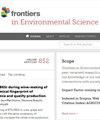Policy deficiencies and contingency plans: groundwater management implications for baseflow contributions to the Colorado River
IF 3.3
3区 环境科学与生态学
Q2 ENVIRONMENTAL SCIENCES
引用次数: 0
Abstract
The Colorado River is a vital water source for the western United States, yet the river is governed by disjointed and outdated policies that have left water management fragmented and water quantities overallocated. Groundwater is an overlooked component of Colorado River Basin (CRB) water supplies, making it vulnerable to overuse from disparities in uncoordinated protective management strategies. In this study, we analyzed state level groundwater policies to reveal the diversity and efficacy of groundwater governance mechanisms. The existing groundwater management plans for each state throughout the basin are fragmented and limited in scope. We found that with policies only covering 22% of the basin, they do not provide adequate protection at the basin scale for the sustainable use of groundwater resources in the face of increasing demands, creating a positive feedback loop that reinforces the scarcity issue. We conclude that a comprehensive management plan that can fully address resource use throughout the CRB is necessary for the sustainable use of groundwater and its contribution to base flow in the Colorado River. We suggest that such a plan could be derived through an interstate compact like the Colorado River Compact that is used for surface water management.政策缺陷和应急计划:地下水管理对科罗拉多河基流贡献的影响
科罗拉多河是美国西部的重要水源,但该河的管理政策脱节且过时,导致水资源管理分散,水量分配不当。地下水是科罗拉多河流域(CRB)供水的一个被忽视的组成部分,因此很容易因不协调的保护性管理策略的差异而被过度使用。在这项研究中,我们分析了州一级的地下水政策,以揭示地下水管理机制的多样性和有效性。整个流域内各州现有的地下水管理计划分散且范围有限。我们发现,由于政策仅覆盖流域的 22%,面对日益增长的需求,这些政策无法在流域范围内为地下水资源的可持续利用提供足够的保护,从而形成了一个正反馈循环,加剧了稀缺性问题。我们的结论是,为了实现地下水的可持续利用及其对科罗拉多河基流的贡献,有必要制定一项能够全面解决整个 CRB 资源利用问题的综合管理计划。我们建议,可以通过类似用于地表水管理的《科罗拉多河契约》那样的州际契约来制定这样的计划。
本文章由计算机程序翻译,如有差异,请以英文原文为准。
求助全文
约1分钟内获得全文
求助全文
来源期刊

Frontiers in Environmental Science
Environmental Science-General Environmental Science
CiteScore
4.50
自引率
8.70%
发文量
2276
审稿时长
12 weeks
期刊介绍:
Our natural world is experiencing a state of rapid change unprecedented in the presence of humans. The changes affect virtually all physical, chemical and biological systems on Earth. The interaction of these systems leads to tipping points, feedbacks and amplification of effects. In virtually all cases, the causes of environmental change can be traced to human activity through either direct interventions as a consequence of pollution, or through global warming from greenhouse case emissions. Well-formulated and internationally-relevant policies to mitigate the change, or adapt to the consequences, that will ensure our ability to thrive in the coming decades are badly needed. Without proper understanding of the processes involved, and deep understanding of the likely impacts of bad decisions or inaction, the security of food, water and energy is a risk. Left unchecked shortages of these basic commodities will lead to migration, global geopolitical tension and conflict. This represents the major challenge of our time. We are the first generation to appreciate the problem and we will be judged in future by our ability to determine and take the action necessary. Appropriate knowledge of the condition of our natural world, appreciation of the changes occurring, and predictions of how the future will develop are requisite to the definition and implementation of solutions.
Frontiers in Environmental Science publishes research at the cutting edge of knowledge of our natural world and its various intersections with society. It bridges between the identification and measurement of change, comprehension of the processes responsible, and the measures needed to reduce their impact. Its aim is to assist the formulation of policies, by offering sound scientific evidence on environmental science, that will lead to a more inhabitable and sustainable world for the generations to come.
 求助内容:
求助内容: 应助结果提醒方式:
应助结果提醒方式:


